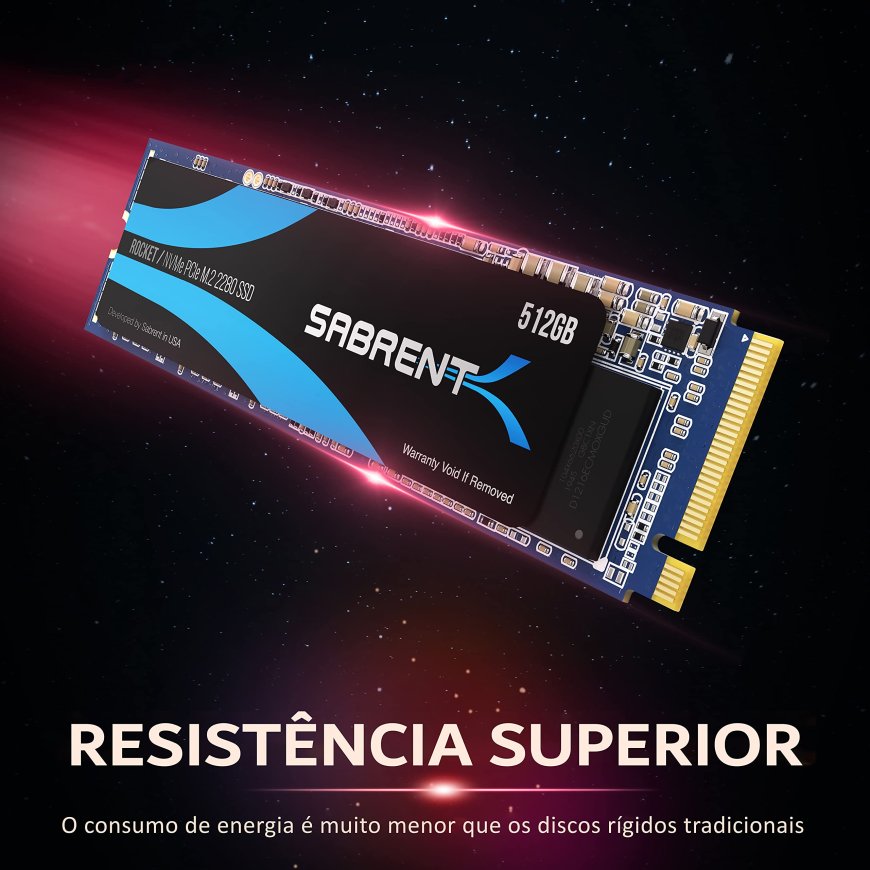Sabrent's Rocket 5: Redefining SSD Speeds with PCIe 5.0
The world of solid-state drives (SSDs) is about to witness a seismic shift as Sabrent unveils its latest creation, the Rocket 5. This cutting-edge PCIe 5.0 SSD is poised to compete with the very best SSDs available today, promising unprecedented read speeds exceeding 14 GB/s and blazing write speeds of over 12 GB/s. In this in-depth exploration, we delve into the impressive features and capabilities of the Sabrent Rocket 5 SSD, which is available in 1TB, 2TB, and 4TB capacities.

Unveiling Sabrent's Rocket 5: A Game-Changer in SSD Technology
Sabrent is no stranger to pushing the boundaries of SSD performance, and with the Rocket 5, they have taken another giant leap forward. This remarkable SSD is designed to deliver exceptional read and write speeds, setting a new standard for what SSDs can achieve. While the 1TB and 2TB variants are set to hit the market soon, the 4TB model is expected to follow suit, catering to users with varying storage needs.
Also check Lenovo T1s Pro Robotic Vacuum Cleaner: Review
Breathtaking Speeds: The Rocket 5 Performance
The Rocket 5's standout feature is undoubtedly its remarkable speed. According to Sabrent, this SSD is capable of achieving read speeds that soar beyond 14 GB/s and write speeds that exceed 12 GB/s. To illustrate the SSD's prowess, Sabrent presented a screenshot of the Rocket 5 2TB model benchmarked using CrystalDiskMark. The results are nothing short of astounding, with read speeds reaching 14,169.83 MB/s and write speeds clocking in at an impressive 12,756.03 MB/s. These figures represent the fastest performance among the four benchmarks conducted using CrystalDiskMark on the SSD.
IOPS: Unraveling the Rocket 5's Performance Metrics
Beyond its impressive sequential read and write speeds, the Rocket 5 also excels in Input/Output Operations Per Second (IOPS), a critical metric for SSDs. Sabrent reports that this SSD achieves a staggering 26,126.95 MB/s in read performance and an astonishing 116,946.78 MB/s in write performance. These numbers highlight the Rocket 5's ability to handle demanding workloads and data-intensive tasks with ease.
Exploring Random 4K Q1T1 Performance
In the realm of Random 4K Q1T1 performance, the Rocket 5 continues to shine. The SSD achieves 107.02 MB/s in read speeds and an impressive 479.01 MB/s in write speeds during this test. These results demonstrate the Rocket 5's versatility, making it suitable for a wide range of applications, from gaming to professional content creation.
Breaking Barriers: PCIe 5.0's New Frontier
The Sabrent Rocket 5 stands as a testament to the rapid evolution of SSD technology. It represents one of the first PCIe 5.0-capable drives to break through the 12 GB/s barrier that previously defined mainstream PCIe 5.0 SSDs. While an additional 2 GB/s may not seem like a monumental leap, it signifies a significant milestone in SSD development.
The Role of Phison's E26 Controller
The Rocket 5's ability to fully exploit PCIe 5.0's potential is attributed to its utilization of Phison's E26 controller. This controller's capabilities align perfectly with the SSD's performance, enabling it to reach speeds that were previously unattainable. It's worth noting that Phison's E26 controller has played a pivotal role in ushering in a new era of SSD speeds.
Production Challenges and Delays
The journey to achieving speeds exceeding 14 GB/s was not without its challenges. One of the major hurdles that hindered the arrival of 14 GB/s+ drives was related to production delays stemming from Micron's high-speed 2400 MT/s NAND flash. Slow demand for DRAM and 3D NAND in 2023 prompted Micron to slow down the ramp-up time for its 2400 MT/s 232-layer 3D NAND, resulting in further delays for drives capable of achieving 14 GB/s+ speeds.
A New Era: Overcoming Production Hurdles
Thankfully, the production challenges related to high-speed NAND flash appear to be in the rearview mirror. This development has paved the way for manufacturers like Sabrent to introduce high-speed SSDs like the Rocket 5. Anticipating further advancements in SSD technology, we can expect both the Rocket 5 and another SSD capable of exceeding 14 GB/s to be announced at CES 2024, with subsequent releases poised to transform the SSD landscape.
The Future of SSD Technology: A Glimpse Ahead
As we embrace the arrival of SSDs that exceed 14 GB/s in speed, it's essential to consider the future implications and potential applications of this groundbreaking technology:
1. Diverse Compatibility: Catering to Varied Needs
SSDs like the Sabrent Rocket 5, with their unmatched speed and versatility, are set to cater to a wide range of user requirements. Their ability to seamlessly adapt to different PCIe interfaces ensures compatibility with evolving hardware configurations, allowing users to harness the full potential of their SSDs.
2. Beyond Traditional Computing: Emerging Applications
The demand for high-speed data transfer extends beyond traditional computing tasks. SSDs capable of delivering speeds exceeding 14 GB/s open doors to emerging fields such as artificial intelligence, 8K video editing, and real-time simulations. These applications require lightning-fast data access, and SSDs like the Rocket 5 are poised to meet these demands.
3. Gaming Advancements: Enhancing Gameplay
The gaming industry constantly seeks ways to enhance gameplay experiences. SSDs that can maximize their bandwidth in various PCIe environments are poised to reduce loading times, eliminate bottlenecks, and deliver seamless gaming experiences, pushing the boundaries of gaming performance.
Conclusion: Sabrent's Rocket 5 - A Speed Revolution
In conclusion, Sabrent's Rocket 5 SSD represents a revolutionary leap in SSD technology, redefining the boundaries of speed and performance. With its remarkable read and write speeds, along with its adaptability across different PCIe interfaces, the Rocket 5 sets a new standard for what SSDs can achieve. As we look ahead, we can anticipate a future where SSDs like the Rocket 5 seamlessly bridge generational gaps, ensuring optimal performance in diverse hardware environments. The arrival of the Rocket 5 marks a significant milestone in the SSD landscape, where versatility and compatibility reign supreme, promising an exciting era of high-speed computing.


































